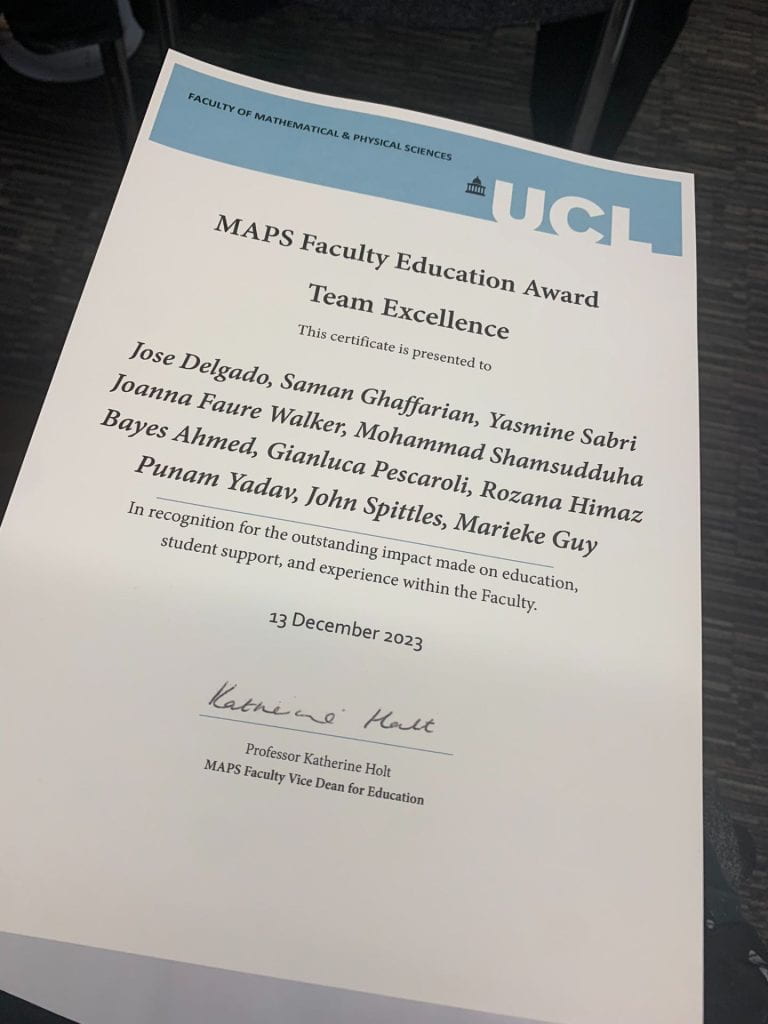At this year’s UCL Education Awards, a collaborative team comprising of members from the Institute for Risk and Disaster Reduction (IRDR) and the Digital Assessment Team earned a nomination in the Assessment and Feedback category. They were distinguished for their ‘creativity within conformity’, showcasing exceptional feedback and inventive use of the AssessmentUCL/Wiseflow platform.
While they didn’t secure the premier position in that category, their outstanding work was far from overlooked. The combined team were recognised at the UCL Faculty of Mathematical & Physical Sciences Education Awards, winning in the Team Excellence category.
The judges commented: “Creativity within Conformity: UCL-IRDR embraces Department-wide shift to AssessmentUCL platform with marking rubrics that find alignment between different disciplines and within interdisciplinary, while celebrating nuanced and subtle differences between subject needs.”
In the following video case study (35 minutes 41 seconds) members of the team (Professor Joanna Faure Walker, Dr Saman Ghaffarian, Jose Delgado and John Spittles) talk about the IRDR departmental decision to move to AssessmentUCL/Wiseflow.

They discuss the change process and the various challenges along the way, and offer advice to colleagues who may be thinking of following suit.
Catalyst for change
The Institute for Risk and Disaster Reduction (IRDR) focuses on research, knowledge exchange, and advanced teaching in the areas of risk and disaster reduction. It offers undergraduate and postgraduate courses that are multifaceted and interdisciplinary. In the summer of 2022 the department made the decision to move their wide range of assessments (oral presentations, group essays, reports, blogs, policy briefs, and other diverse written assessments) from Moodle to AssessmentUCL/Wiseflow.
As Professor Joanna Faure Walker (Joey) explains “The driving reason behind our shift to assessment at UCL was to usher in more conformity in our assessments. This decision was based on feedback from students at the department level, which was corroborated by feedback at the UCL level and even the broader educational sector’. Other motivators include an increase in SORA students and students with Extenuating Circumstances, and the need to keep track of them; the planned introduction of departmental rubrics and the motivation of consistency of feedback.
Transformation blueprint
The process was spearheaded by a collaboration between the department and the Digital Assessment Team. A tailored training package was designed to familiarise both academic and administrative staff with the nuances of the new platform. The training encompassed written guidance and a series of live interactive sessions, all delivered on Teams.
In addition to training, the IRDR team emphasised the importance of a standardised approach to administering and marking assessments. They introduced consistent feedback language and departmental rubrics. The change strategy also involved the collection of invaluable data from module leaders regarding their assessments, and continuous dialogue between the education admin team and the module teams.
Reception and reflection
While students enjoyed the consistency and structure of the platform, for staff, however, the initial transition presented a learning curve. Initial apprehension was met with eventual appreciation for the platform’s standardised rubrics and clarity. The early phase did demand a significant investment in time, training, and comprehension. As Connected Learning Lead Dr Saman Ghaffarian reflects: “It was challenging and time consuming to set up the first assessments and get used to the platform, understand the technology and the roles. It takes time, but finally it is worth it. Now when I am setting another assessment for one of my modules it is super easy.”
Despite the time requirement the benefits of the transition have been manifold. The platform offers lots of assessment design features that will ensure academic integrity, and the feedback features have acted as a powerful tool for student improvement.
Advice for others
All of the team members raised the importance of both collaboration and preparation. It is paramount to begin preparations well in advance, especially when setting up the first assessments. The role of support, be it from administrators or colleagues, is key too. The platform, despite seeming complex due to its novelty and language, becomes straightforward with understanding and regular use.
For the Digital Assessment Team, the journey with the IRDR Department has been enlightening, their next steps include refining the onboarding process for new staff. As Joey ends: “Essentially the next steps are enjoy that it’s now a lot easier that we are not in our first year anymore. We are in a much better place than when we weren’t all using the same platform and doing things in a more consistent way.”
| If departments are interested in using the AssessmentUCL platform they can start by viewing the Steps for Departments. These steps outline best practices and are designed to clarify the expectations of departments in delivering assessments on the platform, get the most out of the existing functionality and avoid some known pitfalls. |


